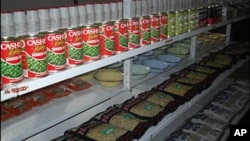The World Bank says Zimbabwe's economy is expected to grow by 1.5 percent in 2016 with consumer prices remaining deflationary due to global and local constraints on its recovery.
Finance Minister Patrick Chinamasa projected in his 2016 national budget that the economy will grow by 2, 7 percent this year up from 1, 5 percent in 2015.
In its first edition of a local report titled ‘Zimbabwe Economic Update’, focusing on Changing Growth Patterns, Improving Health Outcomes, the bank said, “Coming on the heels of a severe drought in 2015, the outlook for 2016 remains difficult and growth is projected to remain around 1.5 percent.”
The bank noted that growth has slowed sharply since 2012 as the impact of “dollarization” ran its course, and the economy’s vulnerability to climate and terms of trade shocks resurfaced. “The global economy is slowing, commodity prices remain depressed, terms of trade with Zimbabwe’s main trading partner are deteriorating, and the impact of the El Nino on agriculture, water and power sectors is already being felt.”
The World Bank said to raise growth from its current medium term trend of 2-3 percent, Zimbabwe will need to correct key macroeconomic balances.
“Recent growth has been largely driven by consumption, and both public and private investment have fallen since 2011. Capital flows, including external borrowing and asset sales, are sustaining consumption growth by financing an unsustainably high current account deficit.”
It further said without exchange rate policy, tackling today’s current account deficit and low investment ratios will require real improvements in productivity and adjustments in public spending, both of which take time but also have a more durable impact on competitiveness.
“These headwinds and the brunt of the economic corrections, both domestic and global, will likely be most deeply felt by poor households. In Zimbabwe, without substantial improvements in the allocation and efficiency of public spending, the recovery could well be regressive – increasing inequality rather than further dampening it.”
The Zimbabwe Economic Update (ZEU) showcases how the introduction of results-based financing for rural clinics has helped to significantly improve maternal and child health care outcomes in Zimbabwe.
According to the World Bank, this innovation, which channels resources to clinics based on quality and quantity measure of care, has not only helped to lower the reliance on user fees that caused many poor households to forego medication attention, but also improved the share of women who achieve the recommended four pre-natal visits as well as other key services during pregnancy.
So far the program has 4.5 million beneficiaries in rural and low income urban areas.
World Bank Zimbabwe senior economist, Johannes Hederschee, said in an exclusive interview that prospects for growth are constrained in Harare.
The ZEU 2015 recognizes that Zimbabwe’s economy made a strong recovery during 2009-14 following “dollarization” and stabilization measures. “The fundamentals for this recovery are still strong, but the headwinds are increasing. Traditional sectors – agriculture, mining and industry are facing key challenges and in the process of structural transformation, the services sector has continued to growth strongly, building on Zimbabwe’s key competitive advantage – its educated population.”





